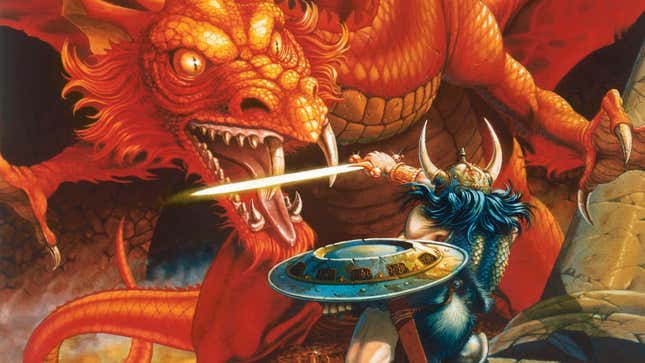
Wizards of the Coast, the company responsible for Dungeons & Dragons, have not had a great week. As io9 reported, plans for a revision to D&D’s Open Gaming License—through which other games from other people can borrow some of D&D’s systems—went down terribly, facing opposition from both fans and other tabletop publishers alike.
As reported last week, Wizards had plans for a new OGL that “significantly restricts the kind of content allowed and requires anyone making money under the license to report their products to Wizards of the Coast directly”. Reactions to this leaked proposal were so negative that, as Dicebreaker point out, they provoked “an onslaught of bad press that included competitors such as Paizo and Kobold Press creating an independently monitored open licence for developing their own tabletop games.”
Now, having had time to survey the wreckage, Wizards have acknowledged that they got it wrong. Very wrong. In a blog post published earlier today Kyle Brink, Executive Producer on D&D, said “let me start with an apology. We are sorry. We got it wrong.”
Brink says that going forwards Wizards will be “more open and transparent”, and that future changes to the OGL will be done in consultation with fans. You can read his full statement below:
Hi. I’m Kyle Brink, the Executive Producer on D&D. It’s my team that makes the game we all play.
D&D has been a huge part of my life long before I worked at Wizards and will be for a long time after I’m done. My mission, and that of the entire D&D team, is to help bring everyone the creative joy and lifelong friendships that D&D has given us.
These past days and weeks have been incredibly tough for everyone. As players, fans, and stewards of the game, we can’t–and we won’t–let things continue like this.
I am here today to talk about a path forward.
First, though, let me start with an apology. We are sorry. We got it wrong.
Our language and requirements in the draft OGL were disruptive to creators and not in support of our core goals of protecting and cultivating an inclusive play environment and limiting the OGL to TTRPGs. Then we compounded things by being silent for too long. We hurt fans and creators, when more frequent and clear communications could have prevented so much of this.
Starting now, we’re going to do this a better way: more open and transparent, with our entire community of creators. With the time to iterate, to get feedback, to improve.
If this sounds familiar, it’s because it’s how we do it for the game itself. So let’s do it that way for the OGL, too.
We’ll listen to you, and then we will share with you what we’ve heard, much like we do in our Unearthed Arcana and One D&D playtests. This will be a robust conversation before we release any future version of the OGL.
Here’s what to expect.
- On or before Friday, January 20th, we’ll share new proposed OGL documentation for your review and feedback, much as we do with playtest materials.
- After you review the proposed OGL, you will be able to fill out a quick survey–much like Unearthed Arcana playtest feedback surveys. It will ask you specific questions about the document and include open form fields to share any other feedback you have.
- The survey will remain open for at least two weeks, and we’ll give you advance notice before it closes so that everyone who wants to participate can complete the survey. Then we will compile, analyze, react to, and present back what we heard from you.
Finally, you deserve some stability and clarity. We are committed to giving creators both input into, and room to prepare for, any update to the OGL. Also, there’s a ton of stuff that isn’t going to be affected by an OGL update. So today, right now, we’ll lay out all the areas that this conversation won’t touch.
Any changes to the OGL will have no impact on at least these creative efforts:
- Your video content. Whether you are a commentator, streamer, podcaster, liveplay cast member, or other video creator on platforms like YouTube and Twitch and TikTok, you have always been covered by the Wizards Fan Content Policy. The OGL doesn’t (and won’t) touch any of this.
- Your accessories for your owned content. No changes to the OGL will affect your ability to sell minis, novels, apparel, dice, and other items related to your creations, characters, and worlds.
- Non-published works, for instance contracted services. You use the OGL if you want to publish your works that reference fifth edition content through the SRD. That means commissioned work, paid DM services, consulting, and so on aren’t affected by the OGL.
- VTT content. Any updates to the OGL will still allow any creator to publish content on VTTs and will still allow VTT publishers to use OGL content on their platform.
- DMs Guild content. The content you release on DMs Guild is published under a Community Content Agreement with Dungeon Masters Guild. This is not changing.
- Your OGL 1.0a content. Nothing will impact any content you have published under OGL 1.0a. That will always be licensed under OGL 1.0a.
- Your revenue. There will be no royalty or financial reporting requirements.
- Your ownership of your content. You will continue to own your content with no license-back requirements.
That’s all from me for now. You will hear again from us on or before Friday as described above, and we look forward to the conversation.
Kyle Brink
Executive Producer, Dungeons & Dragons